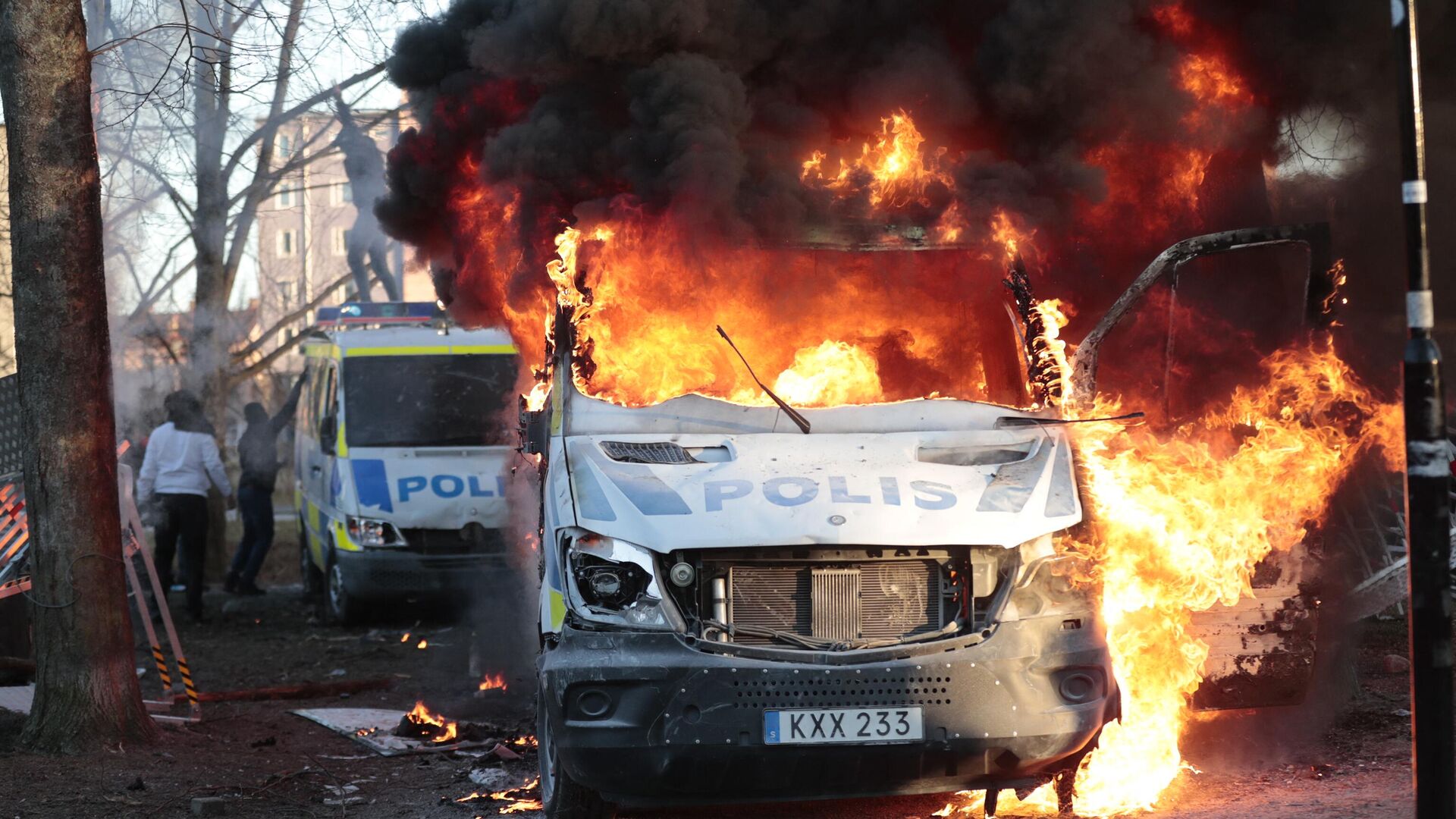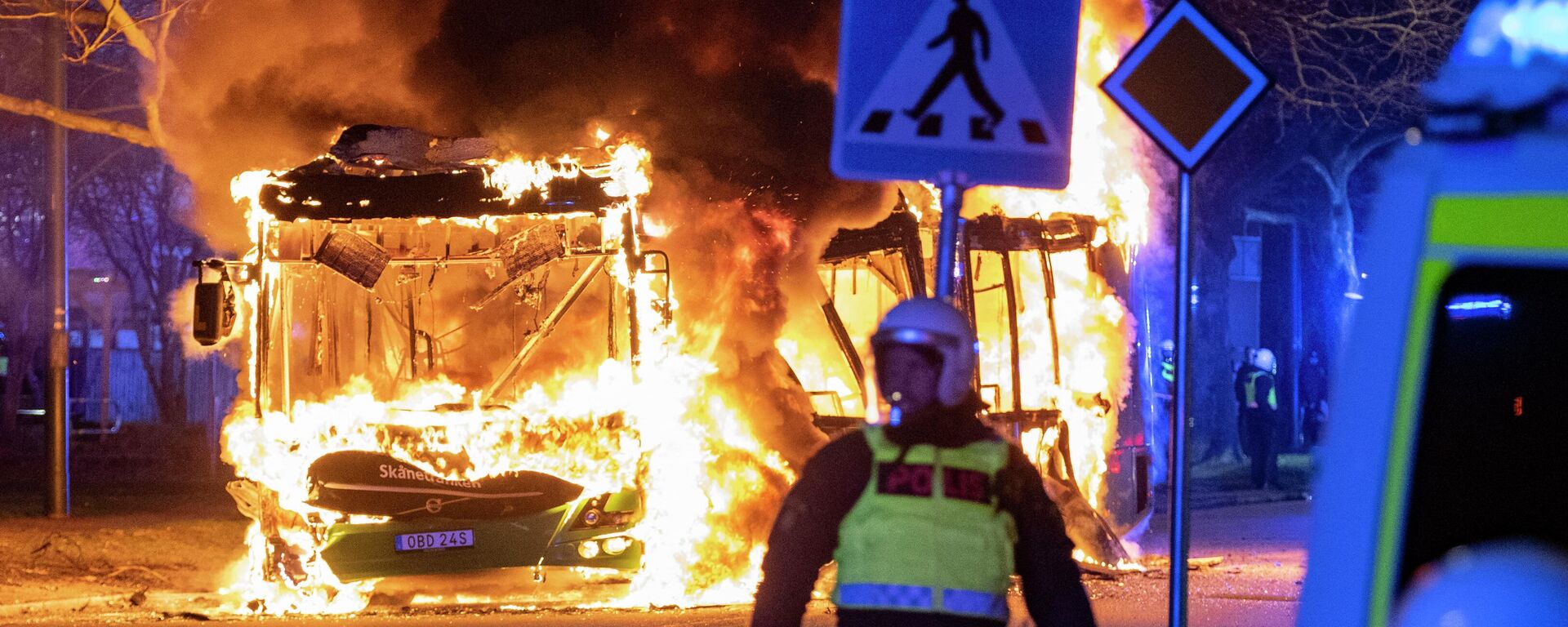https://sputnikglobe.com/20220422/quran-burnings-could-increase-terrorist-threat-against-sweden-authorities-warn-1094957241.html
Quran-Burnings Could Increase Terrorist Threat Against Sweden, Authorities Warn
Quran-Burnings Could Increase Terrorist Threat Against Sweden, Authorities Warn
Sputnik International
The burning of Qurans over Easter sparked a spate of Muslim riots which has led to a petition calling for the practice to be branded a hate crime. However... 22.04.2022, Sputnik International
2022-04-22T06:21+0000
2022-04-22T06:21+0000
2022-04-22T06:21+0000
sweden
scandinavia
islam
newsfeed
quran
hard line
rasmus paludan
https://cdn1.img.sputnikglobe.com/img/07e6/04/11/1094826641_0:160:3073:1888_1920x0_80_0_0_b88b67310d6dd3130ae8d14c0561b629.jpg
In the wake of Quran-burning by Danish-Swedish anti-Islamist politician Rasmus Paludan and his followers, which sparked Easter riots in a number of Swedish cities, the National Centre for Terrorist Threat Assessment (NCT) has warned that events of this type could exacerbate the terrorist threat against the Scandinavian country.So far the terrorist threat against Sweden remains at level three on the five-point scale, according to the NCT's annual assessment. This means that a terrorist act is considered likely.However, there are additional factors to be considered, according to the NCT. For instance, the fact that Sweden is associated with events perceived as insulting to Muslims - or Islam in general - may increase the threat of an attack.The news of the Easter weekend's Quran-burning spread around the world, prompting condemnation from several Arab countries ranging from Saudi Arabia and Egypt to Iraq, which even summoned an embassy council at the Swedish embassy in Baghdad to warn that the burning of Qurans could have serious consequences for Sweden's relationship with the Muslim world.The NCT does not comment on individual events because its main task is to make strategic assessments. But in general, the authorities have already noted that perceived insults have inspired violent movements.The NCT also noted an increased threat from right-wing extremists, citing “an ongoing and possibly increasing polarisation” on issues such as immigration and crime.The recent wave of Muslim riots that ripped through several Swedish cities over Easter, with arson and stone-throwing, led to 26 police being injured and at least 40 people detained, including minors. The overall damage was estimated to cost millions of kronor.The Swedish authorities subsequently condemned both Hard Line leader Rasmus Paludan, who was also reported to the police for “incitement against an ethnic group” despite having the authorities' permission to hold his event, and the abundant use of violence by the angry mob. Paludan promised more demonstrations involving Quran-burning, calling them an “election tour” ahead of the upcoming ballot.In the wake of the Easter riots, a petition to designate Quran-burning as a hate crime has been launched, receiving more than 35,000 signatures.According to lawyer and Örebro University professor, Joakim Nergelius, criminalising Quran-burning would in practice reintroduce blasphemy laws, which were used to prosecute, among others, writer August Strindberg back in 1884. Sweden repealed its law on religious peace, a successor to the blasphemy law, in 1970, as a barrier to freedom of expression.
https://sputnikglobe.com/20220420/easter-holiday-muslim-riots-over-burnt-quran-reportedly-cost-sweden-millions-of-dollars-1094911074.html
sweden
scandinavia
Sputnik International
feedback@sputniknews.com
+74956456601
MIA „Rossiya Segodnya“
2022
News
en_EN
Sputnik International
feedback@sputniknews.com
+74956456601
MIA „Rossiya Segodnya“
Sputnik International
feedback@sputniknews.com
+74956456601
MIA „Rossiya Segodnya“
sweden, scandinavia, islam, newsfeed, quran, hard line, rasmus paludan
sweden, scandinavia, islam, newsfeed, quran, hard line, rasmus paludan
Quran-Burnings Could Increase Terrorist Threat Against Sweden, Authorities Warn
The burning of Qurans over Easter sparked a spate of Muslim riots which has led to a petition calling for the practice to be branded a hate crime. However, experts have pointed out that this would, in effect, reintroduce blasphemy laws which were abolished decades ago as a barrier to free speech.
In the wake of Quran-burning by Danish-Swedish anti-Islamist politician Rasmus Paludan and his followers, which sparked Easter riots in a number of Swedish cities, the National Centre for Terrorist Threat Assessment (NCT) has warned that events of this type could exacerbate the terrorist threat against the Scandinavian country.
“We have seen before that perceived violations acted as a driving force, stimulating the intention to carry out terrorist attacks,” NCT chief Ethel Limén told national broadcaster SVT.
So far the terrorist threat against Sweden remains at level three on the five-point scale, according to the NCT's annual assessment. This means that a terrorist act is considered likely.
However, there are additional factors to be considered, according to the NCT. For instance, the fact that Sweden is associated with events perceived as insulting to Muslims - or Islam in general - may increase the threat of an attack.
The news of the Easter weekend's Quran-burning spread around the world, prompting condemnation from several Arab countries ranging from Saudi Arabia and Egypt to Iraq, which even summoned an embassy council at the Swedish embassy in Baghdad to warn that the burning of Qurans could have serious consequences for Sweden's relationship with the Muslim world.
The NCT does not comment on individual events because its main task is to make strategic assessments. But in general, the authorities have already noted that perceived insults have inspired violent movements.
“I also want to be clear that Sweden is still a legitimate target for terrorist organisations with a pro-violence Islamist ideology, albeit not a prioritised or a designated one,” Limén added.
The NCT also noted an increased threat from right-wing extremists, citing “an ongoing and possibly increasing polarisation” on issues such as immigration and crime.
The recent wave of Muslim riots that ripped through several Swedish cities over Easter, with arson and stone-throwing, led to 26 police being injured and at least 40 people detained, including minors. The overall damage was estimated to cost millions of kronor.
The Swedish authorities subsequently condemned both Hard Line leader Rasmus Paludan, who was also reported to the police for “incitement against an ethnic group” despite having the authorities' permission to hold his event, and the abundant use of violence by the angry mob. Paludan promised more demonstrations involving Quran-burning, calling them an “election tour” ahead of the upcoming ballot.
In the wake of the Easter riots, a petition to designate Quran-burning as a hate crime has been launched, receiving more than 35,000 signatures.
According to lawyer and Örebro University professor, Joakim Nergelius, criminalising Quran-burning would in practice reintroduce blasphemy laws, which were used to prosecute, among others, writer August Strindberg back in 1884. Sweden repealed its law on religious peace, a successor to the blasphemy law, in 1970, as a barrier to freedom of expression.


